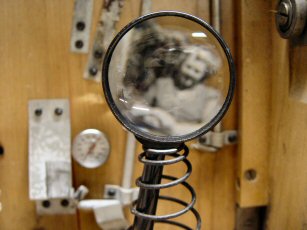
Some family members said I gave her the name because I could not pronounce grandmother. Others contended the name originated because she talked like a Mynah bird–her name was pronounced the same way.
Mina taught me to play Scrabble: how to hit triple letters with a “j” or “x,” how to stretch to make a double word, and how to add an “s” or “d” to the end of a word in order to start a new word perpendicular to the first. If I was stumped, she asked: “Do you have an ‘n’ or an ‘e’? Can you build a four letter word above the ‘d’ to reach the triple word score? Surely you can make a verb in the past tense. A noun? ‘Hand?’ ‘Band?’”
One time I extended “woo” into “wooer” to reach a triple word score. She giggled trying to pronounce it. In subsequent games she asked me if I was going to try to play “wooer” again.
When people ask me who the major influences are in my religious development, I mention Mina first. She knew instinctively that Dr. King was right, even though she was raised in the early nineteen hundreds in south Georgia. She said, “You can do a lot worse than learn to live by the Golden Rule.” She acted as if she could read God’s mind. “God plays no favorites,” she said. “Don’t you know God weeps for those poor people in the housing projects?” She told me once that she had dreamed of being a missionary to Africa when she was a little girl.
When I decided to go to seminary, it was as if I were doing part of it to fulfill her calling. Much of my work has been mission-oriented – working with kids on the streets of inner-city Atlanta, with the rural poor, and teaching seminarians about community outreach.
The day I was ordained as a minister, my mother gave me the bible Mina had given to her as a confirmation gift. Mina’s inscription to her read “Recompense no man evil for evil. If it be possible as much as lieth in you, live peaceably with all men.” (Romans 12:17-18) She wrote these words when lynchings were still happening in Georgia and Hitler and Mussolini were coming into their own. I come from a family of dreamers.
On the day before she died, I visited Mina in the hospital. As soon as I walked in her room, she said, “Oh, Steve, I just took the most wonderful trip before you walked in. I went on a helicopter ride–you know how I’ve always wanted to. We went way up in the air, so high the trees looked like blades of grass. I could see cities and towns way far off. I had the best time.”
When I had arrived at the emergency room a few days before, the nurses told me that she was resting in a darkened X-Ray room. I went to the door and asked, “Mina, are you in there?” to no answer. I spoke again, louder, adding, “It’s Steve. Do you remember me?”
She answered, “Steve? Of course I remember you. I loved you before you were born.”
J. Stephen Rhodes lives on a farm in Berea, Kentucky with his wife, Ann. His essays have appeared in Gettysburg Review, Snowy Egret, and Christian Century; his poetry in Shenandoah, Karamu, and Apalachee Review. He is currently working on a memoir, with special attention to the relationship between self-esteem and service.
photo by Dinty W. Moore
